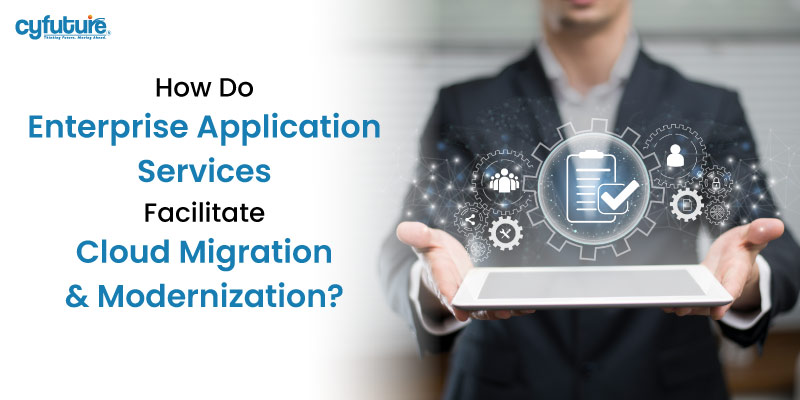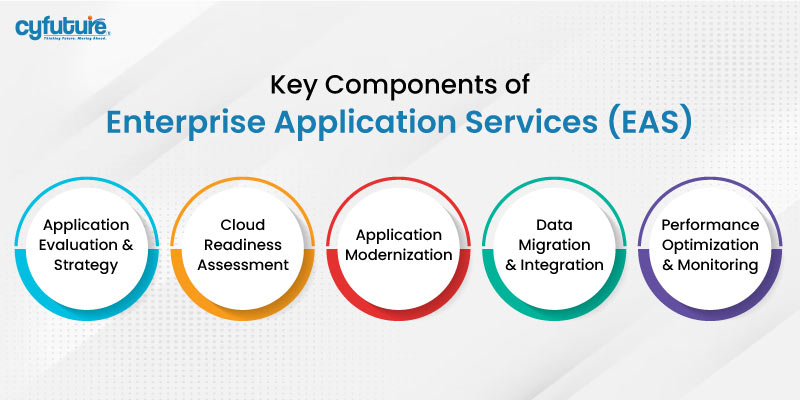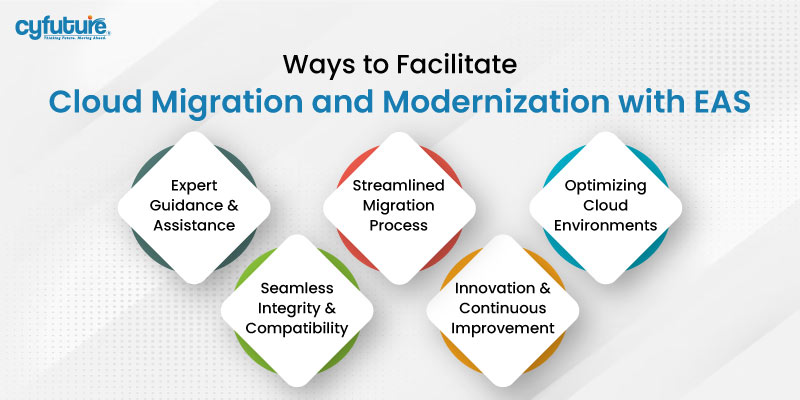Toggle navigation

In today’s rapidly changing digital environment, businesses constantly look for ways to enhance their operations, boost efficiency, and stay ahead of the curve. Cloud computing has given organizations unprecedented opportunities to transform their IT infrastructure and adopt a more flexible and scalable approach to technology management.
Besides, migrating and modernizing enterprise applications to the cloud can be daunting, with obstacles ranging from compatibility concerns to security concerns. Moreover, enterprises are increasingly relying on specialized assistance to navigate this challenging path.
However, let’s take a look into a few stats and data before delving deep.
Now, let’s get ready to examine how enterprise software application services play a role in facilitating cloud migration and modernization.
In today’s digital world, these services can help organizations unleash new levels of ingenuity and competitiveness. These strategies range from enhancing existing systems to unleashing the full potential of cloud-based applications, offering invaluable guidance and support.
Enterprise software solutions and assistance tools are designed to aid companies in handling their intricate software environments. Furthermore, enterprise applications are included in these services from development and deployment to ongoing maintenance and support.
Regardless of whether it pertains to ERP (Enterprise Resource Planning), CRM (Customer Relationship Management), or any other mission-critical application, Enterprise Application Services provides the knowledge and resources needed to ensure optimal performance and functionality.
Each capability in the enterprise application services package plays a vital role in the cloud migration services and modernization process. There are several key components.

It is imperative to evaluate existing applications and formulate a comprehensive strategy before embarking on any migration journey. Application portfolio evaluation and identifying suitable candidates for migration are some of the skills offered by enterprise software application service providers. They also provide a plan for advancing technological progress.
Applications are not created equal when it comes to migrating to the cloud. Application readiness for cloud deployment is determined by in-depth assessments from enterprise software application service providers. This requires considering factors such as scalability, security, and compliance requirements.
They’re tricky to use in the cloud because of their structure and dependencies. Enterprise application service (EAS) providers are adept at updating these programs, making them cloud-ready, and optimizing their performance for the new environment. Configuring monolithic applications into microservices or containerizing existing workloads may be included.
Data is the lifeblood of any organization, so seamless migration and integration are crucial for a successful cloud transition. Enterprise software application service providers provide expertise in transferring data to cloud storage solutions, ensuring compatibility, consistency, and security throughout the process.
Continuous optimization and monitoring are imperative to guarantee optimal performance and reliability after the deployment of applications in the cloud. Advanced monitoring tools and techniques are used by enterprise software application service providers to identify bottlenecks, optimize resource utilization, and address performance issues.
We can examine how these services facilitate cloud migration and modernization now that we have a fundamental understanding of enterprise application services (EAS).

A cloud migration journey can be overwhelming for organizations with limited experience with cloud technologies. Enterprise software application service providers provide expert guidance and support throughout the entire process, from the initial assessment and planning to implementation and ongoing management. They provide expert guidance and support throughout the entire process. They know their stuff and know the tricks to avoid them, speeding up the value chain.
Application migration to the cloud requires a series of complex tasks, including application discovery, dependency mapping, testing, and deployment. Pre-built templates and standardized methodologies are used to facilitate this procedure. The time and effort required for the migration are reduced, as well as the chance of mishaps and disruptions to company operations.
One of the main obstacles to cloud migration is ensuring that applications perform optimally in their new environment. Enterprise application service providers specialize in applying techniques such as auto-scaling, load balancing, and containerization to optimize applications for cloud architectures. These techniques include auto-scaling, load balancing, and containerization. This ensures that applications can effortlessly scale to meet ever-changing demands, while at the same time maximizing resource effectiveness and financial viability.
Applications are rarely isolated in today’s interconnected landscape. Cloud-based applications and pre-existing on-premises systems are seamlessly integrated and compatible with EAS providers. Applications can communicate effectively across hybrid environments, whether they are integrating with legacy databases, third-party APIs, or external services.
The journey of continuous improvement and innovation is not a one-time event. Enterprise software application service providers partner with organizations to drive innovation by partnering with them. They take advantage of emerging technologies such as AI, machine learning, and IoT to unlock new opportunities for growth and competitive advantage. Enterprise Application Service providers help organizations safeguard their applications and infrastructure for the future by staying abreast of the latest trends and best practices.
In conclusion, cloud migration and modernization for enterprises are made possible by Enterprise Application Services. The global marketplace for enterprise software is expected to grow significantly, requiring specialized guidance is a necessity. The market for no-code solutions is expected to expand rapidly, and artificial intelligence will be omnipresent in new business applications by 2025, according to the forecast of IDC.
Application migration and modernization are some of the issues that enterprise software application services tackle. From evaluating application portfolios to ensuring cloud readiness, these services provide expert guidance and support. Standard methodologies and advanced techniques are used to streamline migration processes and minimize disruptions in cloud environments.
To fully exploit the potential of cloud-based solutions, organizations require seamless integration, compatibility, and ongoing advancement. Enterprise application service providers provide the expertise and resources required to achieve these objectives, which aids businesses in remaining agile, innovative, and competitive in today’s digital landscape.
Are you committed to enhancing your enterprise software? Learn more about how our enterprise software application services can accelerate your cloud migration and modernization journey.
Compatibility issues, security concerns, and intricate management of legacy systems are some of the challenges businesses face during the migration process. The enterprise application migration process is aided by specialized solutions and expert guidance.
Assessments of existing applications are carried out by EAS providers to identify suitable candidates for relocating. A seamless transition to the cloud is guaranteed by their comprehensive strategies that include application portfolio assessment, priority setting, and roadmap development.
Businesses interested in using Enterprise Application Services for cloud migration and modernization should reach out to reputable providers to discuss their specific requirements and explore tailored solutions. To ensure a smooth and successful transition to the cloud, it is essential to collaborate with experienced EAS providers.
Cloud readiness assessments are conducted by EAS providers to determine whether applications are suitable for cloud integration. Apps for cloud deployment are evaluated by them, taking into account scalability, security, and regulatory requirements.
Advanced monitoring tools and methods are used to ensure the efficiency and dependability of cloud-based applications. They spot obstacles, maximize resource use, and address issues with performance to make sure everything works flawlessly after the switch.